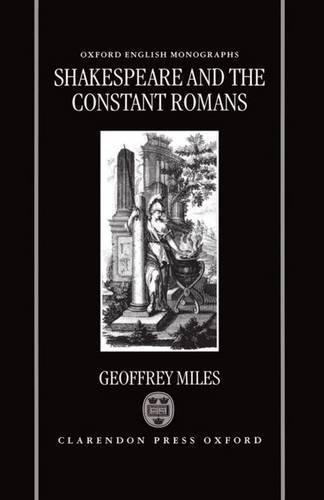Overview
Shakespeare's Romans are intensely concerned with being `constant'. But, as Geoffrey Miles shows, that virtue is far more ambiguous than is often recognized. Miles begins by showing how the Stoic principle of being `always the same' was shaped by two Roman writers into very different ideals: Cicero's Roman actor, playing an appropriate role with consistent decorum, and Seneca's Stoic hero, unmoved as a rock despite having been battered by adversity. Miles then traces the controversial history of these ideals through the Renaissance, focusing on the complex relationship between constancy and knowledge. Montaigne's sympathetic but devastating critique of Stoicism is examined in detail. Building on this genealogy of constancy, the final chapters read Shakespeare's Roman plays as his reworking of a triptych of figures found in Plutarch: the constant Brutus, the inconstant Antony, and the obstinate Coriolanus. The tragedies of these characters, Miles demonstrates, act out the attractions, flaws, and self-contradictions of constancy, and the tragi-comic failure of the Roman hope that `were man/But constant, he were perfect'.
Full Product Details
Author: Geoffrey Miles (Lecturer in English, Lecturer in English, Victoria University of Wellington, New Zealand)
Publisher: Oxford University Press
Imprint: Clarendon Press
Dimensions:
Width: 14.20cm
, Height: 1.80cm
, Length: 22.30cm
Weight: 0.421kg
ISBN: 9780198117711
ISBN 10: 019811771
Pages: 226
Publication Date: 18 January 1996
Audience:
Professional and scholarly
,
Professional & Vocational
Format: Hardback
Publisher's Status: Active
Availability: To order

Stock availability from the supplier is unknown. We will order it for you and ship this item to you once it is received by us.
Reviews
Excellent...A book I wish I had read when writing about Coriolanus and Antony and Cleopatra; I urge it on all those writing about those plays or Julius Caesar in future....It is rare to find such a persuasive combination of tight intellectual history, insightful philosophic analysis, and lively literary criticism. --Studies in English Literature Well argued, with copious notes and comprehensive bibliography...Shakespeare and the Constant Romans fills an important niche in the study of Shakespeare and the classical tradition. --Sixteenth Century Journal. A solid, clearly written piece of scholarship on Stoicism and its influence, which deserves a place in university, college, and seminary libraries. --Religious Studies Review This is a very fine study....Shakespeare and the Constant Romans clearly has many virtues. It is comprehensive in its scholarship, subtle in its readings of individual plays, and thorough in its presentation of Stoicism. --Modern Philology
<br> Excellent...A book I wish I had read when writing about Coriolanus and Antony and Cleopatra; I urge it on all those writing about those plays or Julius Caesar in future....It is rare to find such a persuasive combination of tight intellectual history, insightful philosophic analysis, and lively literary criticism. --Studies in English Literature<br> Well argued, with copious notes and comprehensive bibliography...Shakespeare and the Constant Romans fills an important niche in the study of Shakespeare and the classical tradition. --Sixteenth Century Journal.<br> A solid, clearly written piece of scholarship on Stoicism and its influence, which deserves a place in university, college, and seminary libraries. --Religious Studies Review<br> This is a very fine study....Shakespeare and the Constant Romans clearly has many virtues. It is comprehensive in its scholarship, subtle in its readings of individual plays, and thorough in its presentation of Stoicism. --Modern Philology<br>
Excellent...A book I wish I had read when writing about Coriolanus and Antony and Cleopatra; I urge it on all those writing about those plays or Julius Caesar in future....It is rare to find such a persuasive combination of tight intellectual history, insightful philosophic analysis, and lively literary criticism. --Studies in English Literature<br> Well argued, with copious notes and comprehensive bibliography...Shakespeare and the Constant Romans fills an important niche in the study of Shakespeare and the classical tradition. --Sixteenth Century Journal.<br> A solid, clearly written piece of scholarship on Stoicism and its influence, which deserves a place in university, college, and seminary libraries. --Religious Studies Review<br> This is a very fine study....Shakespeare and the Constant Romans clearly has many virtues. It is comprehensive in its scholarship, subtle in its readings of individual plays, and thorough in its presentation of Stoicism. --Modern Philology<br>




